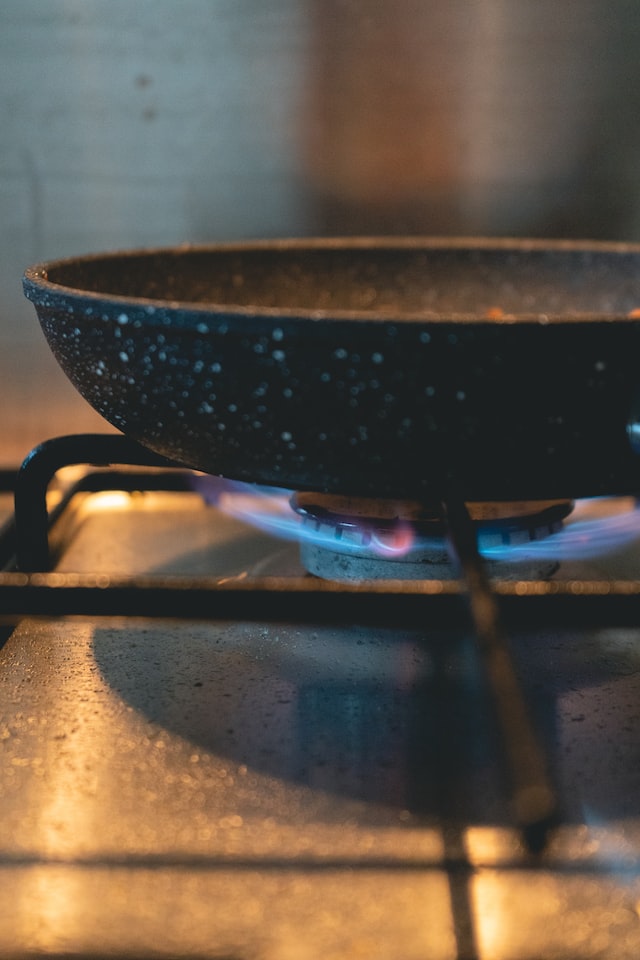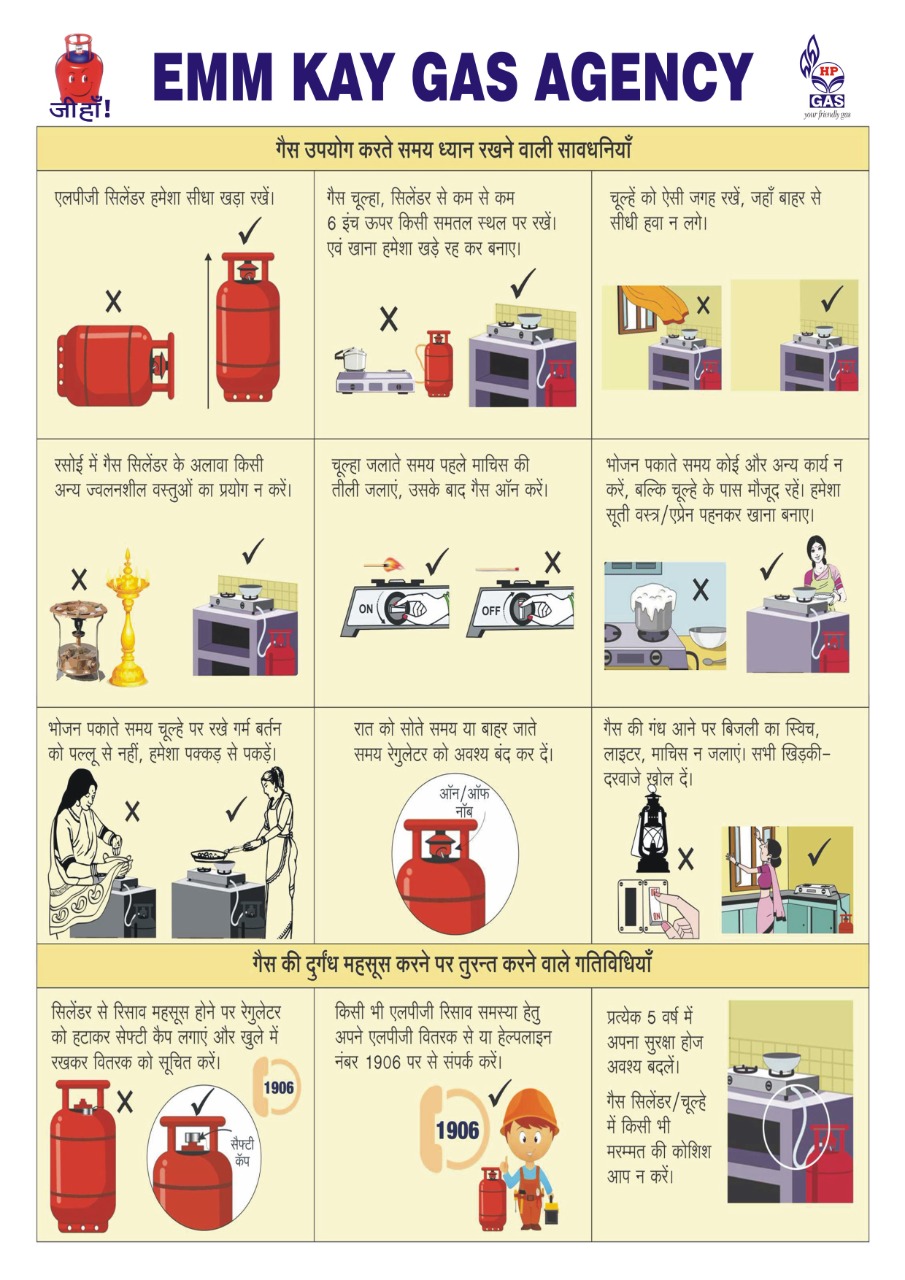Consumer Education
LPG Safety Tips for home
A kitchen is a place where we spend quite some time, with it being used multiple times on a daily basis. Given the fact that most kitchens house a number of appliances, it is important to keep a few simple points in mind to avoid any LPG related accidents. Listed below are some simple LPG safety tips:
-
Never use any appliance which does not meet BIS safety standards. Using sub-standard products could result in damages due to poor quality. Ensure that the LPG regulator and Suraksha rubber tubes in your kitchen have an ISI mark, making sure that you purchase them from your HPGAS distributor. Any damage in the rubber tube or regulator could lead to a gas leak, leading to a chance of explosion.
-
Ensure that you get your equipment serviced regularly. There could be instances where we feel a quick, home-fix remedy is all that's needed, but one should avoid this. Servicing should be done by qualified professionals from trained mechanic of your HPGAS distributor, with periodic maintenance checks done.
-
Check the LPG cylinder DPT (Due for Pressure Test date), Weight, Leakage before delivery. All delivery staff is trained and deployed with equipment’s for PDC (Pre delivery check).
-
Make sure that the seal on safety cap is not tampered or open before you take delivery of the LPG cylinder. Allow delivery staff to open in front you to conduct PDC.
-
If you are unaware as to how to connect an LPG cylinder please request the delivery staff to show how to connect it. DO NOT EXPERIMENT WHILE CONNECTING YOUR LPG CYLINDER.
-
Make sure that the cylinder is kept vertically, in a place which has sufficient ventilation. This is to ensure that gas leaks do not concentrate at one spot. Also ensure that the cylinder is kept at ground level. Do not enclose the cylinder in a cabinet, nor keep it at the same level as the gas stove. Hotplate should be placed above the height of cylinder because LPG is twice heavier than air, in case of leakage LPG will settle down. If hotplate is kept on ground leaked LPG may catch fire and cause accident.
-
Make sure that the gas stove has no curtains nearby. This could accidently lead to fires if the curtains blow onto the stove while it has a flame.
-
Do not keep any other fuel next to the LPG cylinder. A number of times it is observed that people keep kerosene and the cylinder together. This should not be done.
-
Ensure that there are no inflammable materials in the kitchen.
-
DO NOT BUY GAS CYLINDERS FROM THE BLACK MARKET. You might be tempted to purchase them from other sources, but this could pose a risk.
-
Ensure that the cylinder is not close to any heat-generating source (like a stove/coal/ wood).
-
Always ensure that you do not cut/throw the safety cap which comes with the LPG cylinder. This cap can be used to plug on empty cylinder and in case of leak, if any.
-
Never keep the burner knob open while waiting to light a matchstick. Always light the matchstick and then turn on the knob.
-
Do not use synthetic clothes to handle kitchen equipment. These give rise to chances of fire.
-
Ensure that you do not forget about any item on the gas. This could lead to a situation where the contents inside overflow and extinguish the flame, leading to gas leaks.
-
Try to avoid keeping other electrical appliances near the gas cylinder. Any fluctuations could spark a fire in case there is a leak.
-
Ensure you always turn off the regulator knob after use. There are instances where the knob is partially on, which could lead to gas leaks.
IN CASE OF LEAKAGE OR YOU SMELL LPG
1.DO NOT PANIC in case of a gas leak. Stay calm and open all doors and windows in the house.
2.Close all the stove knobs in case you sense a leak. Turn off the regulator as well.
3.Keep the emergency number handy, for experts could be contacted in case of leaks.
4.Contact your HP GHAS distributor and ask them to send help. In late hours or holiday dial 1906 (All India leakage helpline no)
5.Do not touch any electrical switch or appliances like the fridge, TV, lights, etc. These could result in a spark which can lead to fire.
6.Do not use the lighter/matchstick if you sense a gas leak.
7.It is advisable to evacuate the house until experts from the gas agency arrive. Ensure that you follow the simple rule "Safety First".
8.Do not use an electric fan to disperse the gas. An electric appliance can trigger a spark, leading to explosions.
9.You could install gas detectors in the kitchen. These could raise an alarm in case of a leak.
10.Always remember that prevention is better than cure. Stay alert at all times. Keep a fire extinguisher in the kitchen in case of an emergency.
An LPG cylinder has made life easy, being an integral part of our homes. While companies have implemented a number of safety measures to reduce incidents, accidents can happen anytime. The onus of preventing an accident lies on us, and using a few simple measures can ensure that kitchens in India are accident free.


